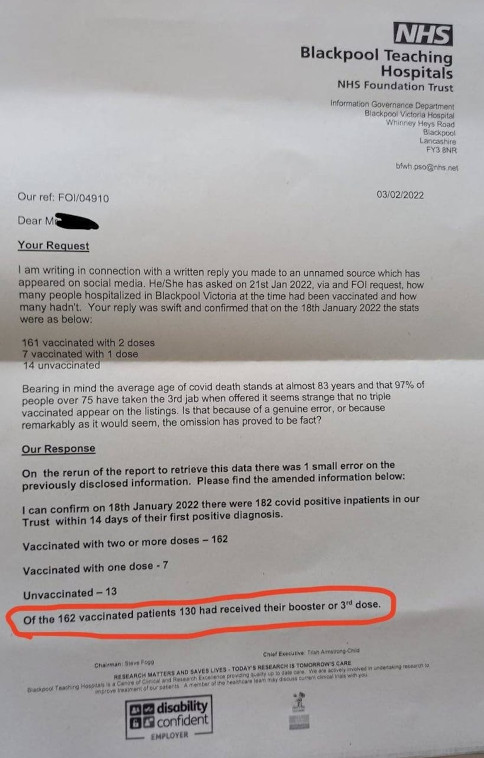Hello Everyone
Below is an open letter written by sixty UK doctors to the Chief Medical Officers of England, Scotland, Wales and Northern Ireland…..You probably won’t be seeing this on the BBC web site or in any newspaper. It appears that the mainstream media are not keen on you having the chance to view it. In fact I am in contact with one of the doctors who signed it, and he told me in an email that it got censored from the original web site it was uploaded to within two hours! (He actually said a lot more to me than I can go into here, I am assuming in confidence). So in the light of censorship I thought I better do my bit and republish it. I receive no personal benefit from doing this and it is a distraction from promoting my business. To those out there who want me to shut up, I will do so gladly if mainstream media, especially the BBC who are legally obliged to report news impartially, actually bother to perform their legal and civic responsibilities.
September 6, 2021
Open letter to:
Professor Chris Whitty – CMO England.
Michael McBride – CMO Northern Ireland.
Gregor Smith – CMO Scotland.
Frank Atherton – CMO Wales.
Dear Professor Whitty, Dr McBride, Dr Smith and Dr Atherton,
We are a group of 60 British doctors and scientists who have grave concerns about the balance of risk for Covid-19 vaccination of healthy children.
The JCVI in their statement on 19th July said that ‘any decision on deployment of vaccines must be made on the basis that the benefits of vaccination outweigh the risks to those people who are vaccinated’, placing the safety of the young in a primary position and drawing attention to ‘rare but serious adverse events’: based on a balanced view of the available evidence, they stated clearly that: ‘the health benefits in this population are small, and the benefits to the wider population are highly uncertain. At this time, JCVI is of the view that the health benefits of universal vaccination in children and young people below the age of 18 years do not outweigh the potential risks’.
Professor Whitty in a press conference earlier in the year had made clear that because of the known though rare side effects of the vaccines and the clear relationship between Covid-19 severity and age, there would be an age below which the balance between benefit and risk would reverse, probably at around 18 years of age. The guidance that children at particularly high risk from Covid-19, such that the benefit was likely to outweigh any risks, would be offered vaccination, seemed a logical position, clarifying the compassionate grounds in the previous JCVI guidance.
We were therefore extremely puzzled when two weeks later, new guidance was issued for the rollout to include healthy 16-17-year-olds but with no new data presented to explain this change in guidance. In a further statement on September 3rd the JCVI have looked again at the safety data and have reiterated that any benefit of vaccination for healthy 12-15s would be marginal and that ‘there is considerable uncertainty regarding the magnitude of the potential harms’.
We note that the Israeli data show a myocarditis risk to young men aged 20-24 after the 2nd dose of Pfizer at 1 in 10,463, rising to 1 in 6,230 for 16-19s. It is therefore particularly concerning that while the 16-17s are only being offered one dose in the first instance (presumably out of concern for this risk), all 18-25s are continuing to be offered a second dose. A recent report of 63 cases of vaccination-associated myocarditis in under 21s from the US, showed significant abnormalities on Cardiac Magnetic Resonance imaging, noted to be more severe than that seen previously in children with MISC-C. There is no long-term follow-up available on these children. Aside from the risks of myocarditis, there are also reports of microvascular clotting following mRNA vaccines, raising the possibility of pulmonary hypertension in future and no long-term safety data, particularly regarding autoimmune disease, carcinogenesis and any possible effects on future fertility.
The decision has now been passed to you, the four CMOs, to consider the impact on wider society and on disruption to education. Recent data has been published by both PHE and the CDC showing that viral loads / transmission rates are similar between vaccinated or unvaccinated individuals, making any consideration of societal benefits fruitless. We also now know that naturally acquired immunity gives broader and better lasting protection than that afforded by vaccination. Vaccines are not required to prevent the educational disruption of school closures and/or isolation of healthy contacts, measures which have already been safely discontinued since 16th August. This would be using vaccination for political rather than health reasons.
We would ask that the CMOs remember the principle of First do no Harm.
Yours sincerely,
Dr Rosamond Jones, MBBS, MD, FRCPCH, retired consultant paediatrician
-Professor Anthony J Brookes, Department of Genetics & Genome Biology, University of Leicester
-Professor Richard Ennos, MA, PhD. Honorary Professorial Fellow, University of Edinburgh
-Professor Karol Sikora, MA, MBBChir, PhD, FRCR, FRCP, FFPM, Dean of Medicine, Buckingham University, Professor of Oncology
-Professor David Livermore, BSc, PhD, Professor of Medical Microbiology, University of East Anglia
-Professor Keith Willison, PhD, Professor of Chemical Biology, Imperial, London
-Professor Angus Dalgleish, MD, FRCP, FRACP, FRCPath, FMed Sci, Professor of Oncology, St Georges Hospital, London
-Dr Theresa Lawrie, MBBCh, PhD, Director, Evidence-Based Medicine Consultancy Ltd, Bath
-Dr Karen Horridge, MBChB(Hons), MSc, MRCP, FRCPCH, Consultant Paediatrician (Disability)
-Professor John Fairclough FRCS FFSEM, retired Honorary Consultant Surgeon
-Professor Norman Fenton, CEng, CMath, PhD, FBCS, MIET, Professor of Risk Information Management, Queen Mary University of London
-Professor John Watkins, Consultant Epidemiologist Cardiff University
-Lord Moonie, MBChB, MRCPsych, MFCM, MSc, House of Lords, former parliamentary under-secretary of state 2001-2003, former consultant in Public Health Medicine
-Dr Roland Salmon, MB BS, MRCGP, FFPH, Consultant Epidemiologist (retired), former Director, Communicable Disease Surveillance Centre (Wales)
-Dr Alan Mordue, MBChB, FFPH, Retired Consultant in Public Health Medicine & Epidemiology
-Dr John Flack, BPharm, PhD. Retired Director of Safety Evaluation, Beecham Pharmaceuticals 1980-1989 and senior vice-president for Drug Discovery 1990-92 SmithKline Beecham
-Dr Gerry Quinn, PhD, Postdoctoral researcher in microbiology and immunology
-Mr Anthony Hinton, MBChB, FRCS, Consultant ENT surgeon, London
-Dr Geoffrey Maidment, MBBS, MD, FRCP, retired consultant physician
-Mr Malcolm Loudon, MBChB, MD, FRCSEd, FRCS(Gen Surg), MIHM,VR, Consultant Surgeon
-Dr Christina Peers, MBBS,DRCOG,DFSRH,FFSRH, Consultant in Reproductive Health
-Dr Noel Thomas, MA, MBChB, DCH, DObsRCOG, DTM&H, MFHom, retired doctor
-Dr Elizabeth Evans MA(Cantab), MBBS, DRCOG, Retired Doctor
-Katherine MacGilchrist, BSc (Hons), MSc, CEO/Systematic Review Director, Epidemica Ltd
-Dr Greta Mushet, MBChB, MRCPsych, retired Consultant Psychiatrist in Psychotherapy
-Mr James Royle, MBChB, FRCS, MMedEd, Colorectal surgeon
-Mr Ian F Comaish, MA, BM BCh, FRCOphth, FRANZCO, Consultant ophthalmologist
-Dr Helen Westwood MBChB MRCGP DCH DRCOG, General Practitioner
-Dr Jonathan Engler, MBChB, LlB (hons), DipPharmMed
-Dr Renée Hoenderkampf, General Practitioner
-Mr Colin Natali, Consultant Spinal Surgeon
-Dr Branko Latinkic, BSc, PhD, Reader in Biosciences
-Dr Kulvinder Singh Manik, MBBS, General Practitioner
-Dr Michael D Bell, MBChB, MRCGP, retired General Practitioner
-Dr Jason Lester, MRCP, FRCR, Consultant Clinical Oncologist, Rutherford Cancer Centre, Newport
-Dr Clare Craig, BMBCh, FRCPath, Pathologist
-Dr Scott McLachan, FAIDH, MCSE, MCT, DSysEng, LLM, MPhil, Postdoctoral researcher, Risk & Information Group
-Michael Cockayne, MSc, PGDip, SCPHNOH, BA, RN, Occupational health practitioner
-Dr Alan Black, MBBS, MSc, DipPharmMed, retired pharmaceutical physician
-Dr Mark A Bell, MBChB, MRCP(UK), FRCEM, Consultant in Emergency Medicine
-Dr Livia Tossici-Bolt, PhD, NHS Clinical Scientist
-Dr Zac Cox, BDS, LCPH, Holistic Dentist, Homeopath
-Dr Emma Brierly, MRCGP, General Practitioner
-Dr Sarah Myhill, MBBS, Dip NM, Retired GP, Independent Naturopathic Physician
and others
After reading this, I ask all of you to consider the following. Where during all this are the pediatricians? Yep, the doctors who are tasked with protecting children both from harm and the risk of harm. We haven’t heard a peep out of them. Oh yes, silly me, almost all of them are silently looking at the floor, their heads presumably bowed in shame. Most, in fairness, are probably too scared to speak up, because if they do, their careers may well be over.
My own view is rather stronger than this. I beleive that Chris Witty, and his immediate colleagues have lost their moral compass entirely. I was well aware of the countless fines that Big Pharma organisations have received for fraud, cover ups, false claims, kickbacks, corruption, lies and intimidation. In fact I think most people are aware of the questionable practises of Big Pharma companies, and the ways that they influence doctors, politicians, and the general public. But I thought better of doctors, and now find myself in the main, disappointed. Fortunately the above open letter shows that there are those who have not lost their way ethically speaking. I wish I could say the same about the entire medical profession.
Mark Lester
Director The Finchley Clinic
www.thefinchleyclinic.com
 Stay Well!
Stay Well!
 With sneeze free and unwatery eyed best wishes
With sneeze free and unwatery eyed best wishes
 Be well and may you have a healthy and happy year ahead.
Be well and may you have a healthy and happy year ahead. 
